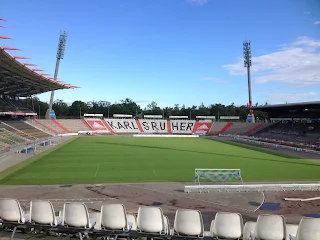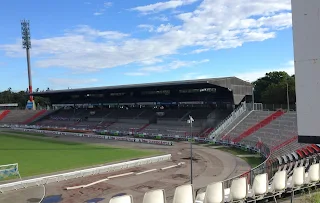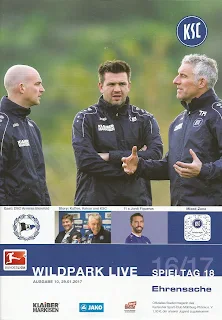Karlsruher
Sport-Club is a German sports club whose
football team are the most prominent feature. The club was formed originally as
Karlsruher Fussball Club Phönix, formed on 6 June 1894 by dissatisfied members
of the gymnastics club Karlsruher Turngemeinde.
They soon
became a prominent club playing in Südkreis-Liga, where they won the title in
1908-09, going on to become national champions by defeating Viktoria 89 Berlin 4–2
in the championship final.
In 1912,
Phönix merged with KFC Alemannia to form KFC Phönix, Phönix Alemannia. As
Phönix Karlsruhe the club became members of Gauliga Baden, which was one of
sixteen top flight divisions created by the ruling Third Reich.
The club had
a moderate record, with a relegation and then an immediate return over the war
years before Phönix joined the newly formed Oberliga Süd once the conflict was
over. In the second season, Phönix were demoted.
Throughout
this early period a couple of other clubs had appeared on the local scene that
would eventually come together. 1. FV Sport Mühlburg and Viktoria Mühlburg had
merged to form FC Mühlburg in 1905. Meanwhile FC Germania and FC Weststadt
joined together to form VfB Karlsruhe in 1911. FC Mühlburg and VfB Karlsruhe
would in turn merge to form VfB Mühlburg in 1933.
The clubs
that had merged to form VfB Mühlburg hadn’t really achieved a great deal but as
one they were awarded a place in Gauliga Baden. After the war they slipped, but
then won the Oberliga Süd in 1946-47. In 1950-51 they came third in the national
championships.
On the 16th
October 1952 VfB Mühlburg merged with KFC Phönix to form Karlsruher Sport-Club
Mühlburg-Phönix e. V.
The newly
united club was an immediate success. In 1954-55 they lifted the DFB-Pokal
German Cup with a 3-2 win over FC Schalke 04 in front of 25,000 fans in
Braunschweig with goals from Ernst Kunkel, Kurt Sommerlatt and Oswald Traub.
At the same
time the club moved into the newly built Wildparkstadion. Karlsruher retained
the trophy with Ludwig Janda in charge of the team. This time they defeated
Hamburger SV 3-1 as 25,000 cheered them on at Wildparkstadion thanks to two goals
from Bernhard Termath with Spitz Kohn adding a third.
Oberliga Süd
championships were won in 1955-56, 1957-58 and 1959-60. The last celebration was nearly
converted into a double, but KSC went down 3-2 to Borussia Mönchengladbach in
the Pokal final. The clubs’ fine record led to a place in the newly formed
Bundesliga in 1963.
Following a
few seasons of struggle, Karlsruher were relegated to Regionalliga Süd in
1967-68. They lifted the title in 1968-69 before two runners-up places in the
following two seasons. Another second place came in 1972-73. On each occasion
the side fell short in the promotion rounds.
Karlsruher
were placed in the newly formed 2. Bundesliga Süd in 1974-75, which was won at
the first attempt to return to the top flight for the 1975–76 season as Bernd
Hoffmann put the goals away.
The team
went back down in 1976-77 where Emanuel Günther became the new scoring hero. A
runners-up place in 1979-80 led to a 6-4 aggregate play-off win against Rot-Weiss
Essen to secure a return to the top flight.
 |
How Wildparkstadion will look when completed
|
Karlsruher lasted
three seasons in the Bundesliga before being relegated in 1982-83. The team
returned as second tier champions twelve months later with Wolfgang Schüler joining
in with goals alongside Günther under coach Werner Olk.
However, the
jump proved too much as KSC went down after just one season. In 1986-87 the
team returned to the Bundesliga as runners-up with the assistance of the goals
of Rainer Schütterle.
This time the team consolidated for a few seasons. New coach
Winfried Schäfer KSC progressed. A fine 1992-93 campaign led to a place in the
UEFA Cup for the following season. Karlsruher defeated PSV Eindhoven, Valencia CF, Girondins Bordeaux
and Boavista before going out at the semi-final stage to Austria Salzburg on
away goals.
To see the
action from the amazing 7-0 victory over Valencia during the run, click here:
Karlsruher
continued to put in strong Bundesliga performances, which led to two more UEFA
Cup runs, reaching the third round both in the 1996–97 and 1997–98 seasons.
They also reached the DFB-Pokal Final in 1995-96, but lost the showpiece in Berlin
1-0 to 1. FC Kaiserslautern.
Schäfer was
fired in March 1998 after a fine run at the club. Sadly they were relegated at
the end of that season. A terrible 1999–2000 season played under dire financial
circumstances dropped them down to the Regionalliga Süd, from where they
bounced back at the first attempt.
In 2006-07
KSC won 2.Bundesliga with three games remaining to return to the highest echelon
of the German game. They lasted just two seasons before being relegated to the
second tier once again. A further demotion down to Regionalliga Süd came at the
end of the 2011-12 season, but once more KSC fought straight back.
The 2014-15
season ended in agony for Karlsruher. They ended the season in third place in
2. Bundesliga. This awarded them a play-off match for a place at the top table
against Hamburger SV who had finished third from bottom in the top division. In
the first leg at Volksparkstadion, KSC scored a vital away goal in a 1-1 draw.
In the return game a goal from Reinhold Yabo in the second half looked to have
sealed promotion for Markus Kauczinski’s side. However HSV equalised in
stoppage time before winning the game in extra time.
Tomas Oral
lasted a few months as coach from the summer of 2016 before being replaced by Mirko
Slomka and then Marc-Patrick Meister as a calamitous 2016-17 campaign saw KSC
go down in bottom place.
The team
regrouped and finished third in the 3. Liga season of 2017-18 with Fabian
Schleusener top scoring after Alois Schwartz had taken over as coach. Karlsruher
lost 3-1 on aggregate to FC Erzgebirge Aue in the play-offs.
Marvin
Pourié put away the goals in 2018-19 as KSC won promotion in second place while
work began on demolishing Wildparkstadion in bits to completely rebuild it as a
34,000 seated stadium minus the running track but allow the team to remain
during the works.
Philipp
Hofmann scored goals on the clubs return to 2. Bundesliga in the 2019-20 season
as the team avoided the relegation play-off on goal difference with Christian Eichner being appointed
as coach just before the interruption for the Coronavirus outbreak.
Karsruher SC
will play in 2. Bundesliga in the 2020-21 season.
My visit
Saturday 15th
August 2015
When I
turned up at Gatwick Airport for a night’s sleep before a weekend jaunt to
Stuttgart on the Thursday night, I had absolutely no thoughts of visiting the
Wildparkstadion. Indeed, the most I expected to see of the city of Karlsruhe
was a quick drink between drinks on the journey to Freiburg and back. How
little I knew!
Having missed the
flight to my intended destination, which was entirely my fault. I now had to resolve
the situation. There were no available seats to Stuttgart until the Sunday. I
used my geographical knowledge plus Easyjet and DB Bahn (german Railways) Apps
on my IPhone to dig myself out of what would be an expensive hole.
Having
managed to secure a seat on an afternoon flight just over the border in
Strasbourg, I phoned my hotel to defer my booking until the Saturday night. I
then booked a room in Karlsruhe for the evening to cut down on the train
journey on both days. This would give me an evening and a couple of hours the
next morning in a new city to me.
Ironically
the train that would require a change in Offenburg, went straight past the
Stade de la Meinau home of RC Strasbourg Alsace, who had a home fixture later
in the evening. I could have got a game in to replace the fixture I was missing
between 1.FC Heidenheim and Fortuna Düsseldorf. Strasbourg was duly added to my
must do list.
The taxi
driver at Karlsruhe station seemed intent on giving me a city tour, though to
be fair much of the centre was hampered by road works as an underground tram
system is installed to free up the traffic. Eventually I found the City Hotel,
where my room was clean and basic but the welcome very cordial.
The city had
a beautiful castle in front of fine old buildings and I found a superb light show
accompanied by music on the Schloss walls. Plenty of locals were also taking in
the spectacle. To round off a long but fascinating day I came across the Badisch
Brauhaus on Stephanienstraße. I tried their dark (dunkel) beer and did my
puzzles before retiring for the evening.
I was up and
about at 8am the following morning. The welcome at breakfast was just as
welcoming. The hotel really did employ helpful and polite staff. I left my bag
on reception before heading off on a walk in the sunshine.
The Schloss
looked just as pretty in daylight with its golden walls. It was set around lots
of lawns and parks. With museums and the city’s university bordering the land.
I continued using the map from the hotel and cutting through the campus to
where I presumed I’d find the Wildparkstadion.
I was pretty
sure I was heading in the right direction and was about to continue, when I saw
the magnificent sloping floodlight pylons to my left though the trees of the
forestry. Needing no second invitation I was soon on the right path. Regular
signposts were a help.
It turned
out that the gates to the stadium’s outside perimeter were open with workmen
carrying out tasks in various outbuildings. I walked up the steps to the back
of the curve behind one of the goals. The wire gate to get down into the
spectator areas was closed but I had a perfect view of the arena.
Wildparkstadion
was like so many stadiums I grew up watching on TV as British clubs went
overseas to try and secure results in the European competitions. The four
corner floodlight pylons leant over open covered ends curved behind the 400m
running track. Each end had centre sections for seating with terracing at
either side.
The Main Stand was two tiered seating, while opposite the cover
was the same height as the terrace with seating behind the terracing. A huge
scoreboard was behind the goal at my end. It was a proper old school
continental ground.
Part of my
plan was to also get some photos of the reserve team arena as well as the other
pitch that Google Maps picked out. They l;ooked to belong to a local club. As
it was I decided to head back along the correct path and thank my blessings
that I’d had an unexpected bonus.
After
picking up my bag I was soon on the tram down to the station to jump on board
for a ride down to my lunchtime game at Freiburg.
Karlsruher
SC 3 Arminia Bielefeld 2 (Sunday 29th January 2017) 2. Bundesliga
(att: 13,145)
With my
appetite being wetted after my earlier visit to Karlsruhe, I didn’t hesitate to
head south from Bonn, where I’d stayed the previous the night, to take in a
match. I had two
travel options. I could either go by train, which was quicker but expensive, or
use FlixBus.
Having used this company quite happily in France, I had no
problems with them. Sure enough my service picked me up on time and gave me a
comfortable ride down the Autobahn and through the Black Forest, arriving at my
destination around fifteen minutes behind schedule.
I could have
just about made it to the Wildparkstadion for the 1.30pm kick off by tram and a
very brisk walk; but I decided to take a taxi, which probably proved to be a
sensible move as the stadium was further than I thought.
The ring
road around the park had cars parked up either side. My driver dropped me a
couple of hundred yards short of the turnstiles where the police had set up a
pedestrian zone. I grabbed a programme for €1 and soon found my correct
entrance.
I’d booked
my €20.90 ticket and printed it online with my choice being made with the
knowledge of my previous look, knowing I’d be in the stand nearest the road. It
really was an old school venue which reminded me of entering the old Long Side
at Burnley’s Turf Moor in my younger days.
Facilities
were just inside the gates with entrance to the stand being up steep steps on a
grass bank. Once inside it wasn’t any more modern. There was a wide concourse
at the back before the seats and then a terrace led down to the track.
There
was another smaller tier on top of my location. Although each ticket had a seat
number, it was possible to move along into any vacant places.
The teams
came out to a fantastic reception from the home fans in front of me, who had
choreographed a fantastic show with ticket tape and banners, which were removed
before kick off. The few hundred hardy visitors from Bielefeld were in the
corner to my left.
To take a
look of my view of proceedings, click here.
It was the
first game in charge for new KSC coach Mirko Slomka. What he made of the first
half goodness knows, but it wasn’t the best. Proceedings weren’t helped by the
shortage of beer in the kiosks.
Whether
there’d been some sort of delivery issue I’m not sure, but I ended up going
back downstairs and halfway round the back of the far goal before I found
anywhere. Many fans were not best pleased and gave up. I didn’t miss too much
on the pitch.
Both sides
were at the wrong end of the table, and this was reflected in the standard of
the play. I’d seen Arminia ship four goals at Dusseldorf earlier in the season,
and they seemed to have done some work with their defence, but goal mouth
action was sparse.
Six minutes
after the break it was the visitors who went ahead when Reinhold Yabo set up
his skipper Fabian Klos to score. Jordi Figueras made it 1-1 just after the
hour mark when he headed home a corner from Moritz Stoppelkamp.
Three
minutes later the game was lit up by a brilliant goal from Dennis Kempe as he
pulled off an outrageous piece of skill to go past Julian Börner and fire a tremendous
shot into the top corner of the net which left the Arminia custodian Wolfgang
Hesl without a chance.
The home
fans were naturally delighted, but they were put in check as Bielefeld fought
back to level when Tom Schütz scored with a direct free kick to make it 2-2 and
complete a frenetic period which had spurned three goals in five minutes.
Hiroki
Yamada was pulling the strings for Karlsruher in midfield as they searched for
a valuable winner. He sent through Boubacar Barry but keeper Hesl forced him
wide and the chance was gone.
Arminia had
a good shout for a penalty turned down before Stoppelkamp fired in a low cross
that defender Tomasz Holota scuffed to the feet of Erwin Hoffer who fired home
to make it 3-2 with just eight minutes of normal time remaining.
Both sides
had opportunities in the final few minutes, but KSC hung on for a valuable
three points. Although the second half was not too high on quality, it had
provided plenty of excitement and entertainment.
At full time
I put on a steady pace to walk around Adenauerring to Durlacher Tor from where
I took a tram back to Karlsruhe Hauptbanhof where I had time to grab some
refreshments before my train to Mainz to watch the match between Mainz 05 and
Borussia Dortmund.

























































